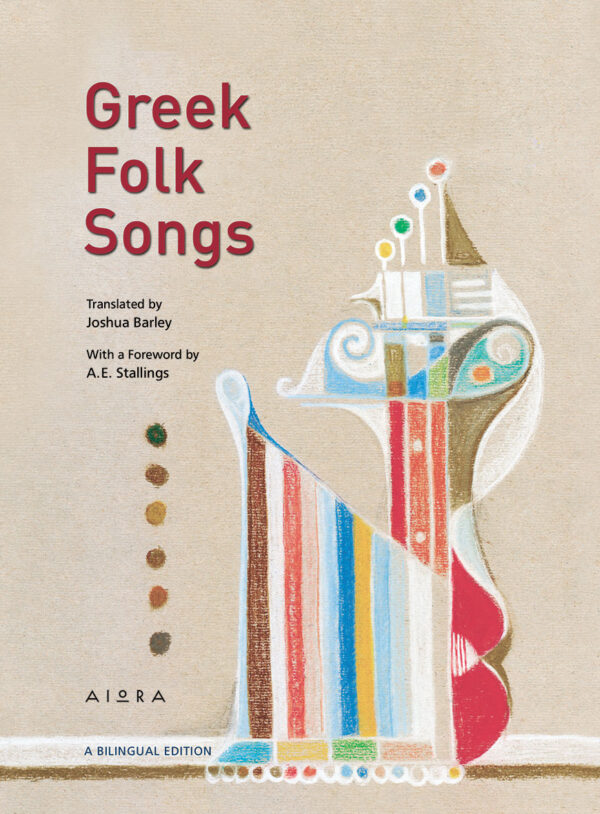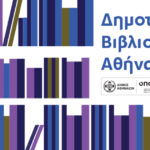The Greek folk songs—Dimotika Tragoudia in Greek— are not only a deep spring from which modern Greek literature draws, they form a bedrock of the modern Greek vernacular itself and the roots of a young national identity. The Greek folk songs are songs of the Greek countryside, from island towns to mountain villages. They have been passed down from generation to generation in a centuries-long oral tradition, lasting until the present. They are songs of every aspect of old Greek life: from love songs and ballads, to laments for the dead, to songs of travel and brigands. Written down at the start of the nineteenth century, they are the first works of modern Greek poetry, playing a crucial role in forming the country’s modern language and literature. Still known and sung today, they are the Homer of modern Greece.
Translated by Joshua Barley, Greek Folk Songs [Aiora Press, 2022] aims to bring the songs to an English readership for the first time in over a century, capturing the lyricism of the Greek in modern English verse. As Barley explains, “When I decided to compile and translate an anthology of dimotika tragoudia, I knew that I had my work cut out! These ‘folk songs’ do not comprise a fixed corpus of texts, of the kind that a translator usually faces. Rather, they are the relics of a once-living oral tradition, the congealed lifeblood of a world that no longer exists. The range of their content is huge: there are love songs, murder ballads, songs of brigands, as well as ritual laments for the dead and quasi-laments for those departed abroad. Each category makes different demands on the translator”.
Indeed, as works of oral composition, these folk songs must be understood in a radically different way from written literature. They are mainly products of the community as a whole, composed collectively, expressing the communal view, and passed down with slow (if any) development through the generations. It might be helpful to think of the system of folk songs as a language, rather than as individual creations. And each user of a language must stick to a particular grammar, which has been worked out over centuries and which carries within it an embedded collection philosophy and social function.

The songs collected in the book are drawn from various collections and anthologies compiled over the last two hundred years, from the first published collection of Greek folk songs by Claude Charles Fauriel in 1824. “The first challenge, therefore, came in making the selection. It was unthinkable for me to read all this material, but I intended to find a representative selection from what I considered to be the most significant and authentic collections, without bias to a particular region. Many songs are repeated in different collections. But due to the variable nature of oral poetry, they are all different: not merely in spelling, but in their structure, wording and detail. Which variant do you chose? Why? Such decisions must constantly be made, even if the answer comes down merely to personal preference”, says Barley.
The Greek folk songs have a very particular style and form: they contain short, autonomous clauses, with lots of repetition, and they are (almost) all in the same metre: the fifteen-syllable line (dekapentasyllavos). There is a set of codes underlying Greek oral poetry, of a kind that written poetry does not need. “I experimented with various possibilities until I found a form that provided a satisfactory compromise. I used a flexible metre, which approximates to the dekapentasyllavos without being tied to its strictures. I aimed to keep as close to the Greek as possible, but without the English feeling stilted, stretched or twee. I wanted these translations to work as English verse, while carrying the spirit (sometimes the strangeness) of the Greek. I hope that the reader feels the linguistic and poetic beauty of these works, while sensing that they are delving into an entirely different world”.
Αs A.E. Stallings eloquently put it in the book’s foreword, “Barley approaches the songs as lyric and literature; here they are stripped of political agenda and are free from the academic concerns of early folklorists. He possesses a contagious joy in their rich language, efficient narrative, and inventive metaphors, in their human rather than national dimension, even as he places them within the context of the rituals and traditions of village life”. Undoubtedly, with the generous inclusion of the Greek, this treasury should mark a new era of interest in, and influenced by, these songs for twenty-first-century Anglophone poets, song writers, and translators, even as they have inspired poets, Greek and non-Greek alike, in the past.
A.R.
Read also: BOOK OF THE MONTH: Rebetika – Songs from the Old Greek Underworld
TAGS: LITERATURE & BOOKS | READING GREECE













